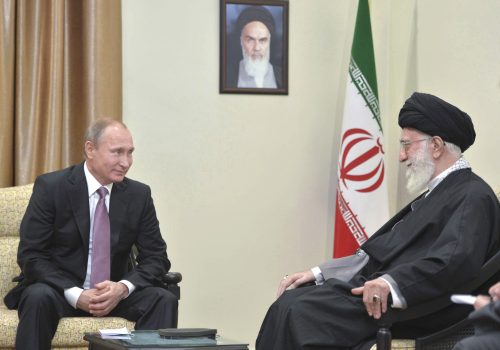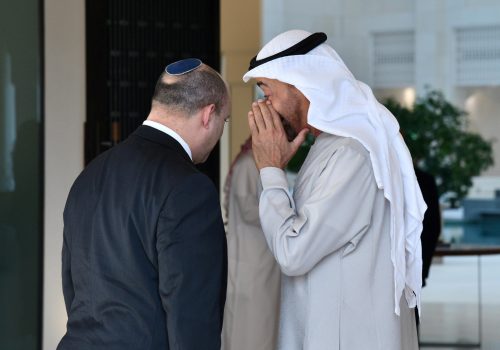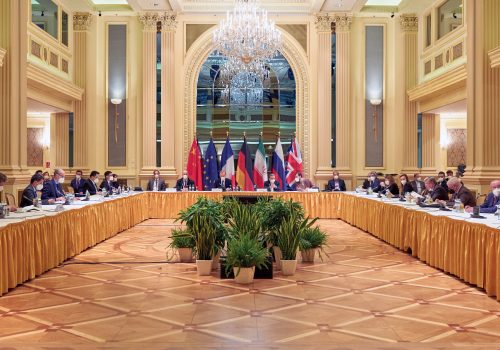The potential side benefits of a revived JCPOA for Middle East stability
The Joint Comprehensive Plan of Action (JCPOA) is a nuclear deal that trades sanctions relief for verifiable curbs on Iran’s nuclear activities. But the JCPOA is also the key to regional de-escalation between Iran and its Arab rivals across the Persian Gulf. Without it, tensions are likely to rise, including threats to US forces in Iraq and Syria.
Critics of the JCPOA argue that a revived deal will put more money in the pockets of the regime and Iran’s Islamic Revolutionary Guards Corps (IRGC). Certainly, Iran will be able to increase funding for weapons and activities abroad. But the argument against the deal neglects to mention that the IRGC has become more aggressive since the Trump administration unilaterally quit the JCPOA in 2018 and reimposed sanctions on Iran. Indeed, State Department spokesman Ned Price told reporters on March 31, 2022 that “from 2012 to 2018…there were no significant attacks against US service members, diplomatic facilities in Iraq” but that “between 2019 and 2020, the number of attacks from Iran-backed groups went up 400 percent.” Removing the State Department’s designation of the IRGC as a Foreign Terrorist Organization—something Tehran has demanded in the Vienna talks—would not affect the group’s pariah status for Western investors and could actually lead to a reduction in violence directed against US targets.
Attacks on Americans by Iran and Iran-backed groups were partly motivated by revenge for the Trump policy of “maximum pressure,” which sought to throttle the Iranian economy through what amounted to an oil embargo. Those sanctions, while initially inflicting brutal damage on Iran’s bottom line, have led to massive smuggling and other evasive tactics that have benefited the IRGC and hurt ordinary people. Lifting those restrictions means that Iran can rapidly increase legitimate sales, helping to stem the shortages and price spike caused by sanctions on Russia over its invasion of Ukraine.
Restoring the JCPOA will facilitate other trade and give new opportunities to Iran’s embattled private sector. It will reinvigorate commerce between Iran and its neighbors and benefit Iraq in particular. Having been an intermittent battleground between the US and Iran since the US overthrow of Saddam Hussein in 2003—but especially since 2019—Iraq desperately needs peace and economic development. A more stable Iraq will be more attractive to foreign investors, who can provide jobs to Iraq’s youth and offer a constructive alternative to joining an Iran-backed “popular mobilization unit,” as the militias are known.
A revived JCPOA should also improve the atmosphere for a durable ceasefire and eventual political solution to the horrendous war in Yemen, where tens of thousands have died in a grueling conflict that has also provoked retaliatory missile attacks on the United Arab Emirates and Saudi Arabia by Houthi forces. Iran does not control the Houthis, but it does have influence and can cut back on arms supplies that have fueled the fighting.
The Saudis and the Emiratis had already begun to reach out to Iran in the aftermath of the drone and missile attacks and in anticipation of a revived JCPOA under the Biden administration. Restored diplomatic relations, particularly with Saudi Arabia, would give Iran an incentive to cut back on purported subversive activities among Saudi Shia in return for the Saudis reducing support to Sunni opponents of the Iranian regime.
The Emiratis could also provide a backchannel for Israel and Iran to de-escalate their dangerous and increasingly overt “shadow war.” Under a renewed JCOPA, Iran’s nuclear program would be rolled back and placed under rigorous inspection again by the International Atomic Energy Agency. If Iran lives up to the letter and the spirit of its agreement, Israel should then be willing to stop its campaign of assassinations and sabotage, which have previously provoked Iranian retaliation on Israeli targets in Iraq and sparked further Iranian nuclear advances.
Even if it takes time to realize these side benefits, a revived JCPOA can help pause the escalatory spiral in the region. In the Middle East, it would be a major accomplishment just to keep things from getting worse.
Nasser Hadian, a respected Iranian academic with years of access to the thinking of Iranian national security officials, has outlined a worst-case scenario if the deal cannot be restored. Iran could announce that it is giving notice of its intention to quit the nuclear Non-proliferation Treaty (NPT). This would increase fears that Iran is going to follow the path of North Korea—the only country to leave the NPT since the treaty went into force in 1970—and develop nuclear weapons. As Trita Parsi of the Quincy Institute noted in his report of Hadian’s comments, the Biden administration would, at a minimum, likely augment its military presence in the Persian Gulf, which could lead to new confrontations between US and Iranian forces. It would also make it harder for Washington to focus on the larger strategic threats posed by Russia and China.
Worst case scenarios aside, without the JCPOA, regional tensions will almost certainly continue to rise. Saudi and Emirati oil facilities and infrastructure will remain under threat from missiles and drones and US forces in Iraq and Syria will have to stay on high alert. The death of Americans in an attack by Iran or Iran-backed groups would likely destroy the JCPOA once and for all, reversing more than a decade of diplomacy and putting new strains on Iraq’s fragile politics.
A return to the JCPOA will not change Iran’s goal of driving the US out of Iraq or end Iranian support for the Houthis. Nor is it likely to lead to anything more than a very brittle détente between the US and Iran. However, it will allow US diplomats to sit in the same room with Iranians again under the rubric of the Joint Commission that monitors JCPOA compliance. That opens the prospect of the US raising other issues directly with Iran—something it has been unable to do since Trump quit the deal—in addition to supporting regional diplomacy.
Timing is key here. Iran is close to a possible political inflection point, as Supreme Leader Ayatollah Ali Khamenei marks his thirty-third year in power and his eighty-second year on the planet. The current administration in Tehran has pursued a “Look to the East” strategy, strengthening ties with fellow autocracies in Russia and China despite Russia’s brutal invasion of Ukraine and the pro-Western orientation of many Iranians. If there is to be any chance of recalibrating this policy after Khamenei dies, as many inside Iran and outside it would like to see, reviving the JCPOA is a necessary first step.
Barbara Slavin is the Director of the Future of Iran Initiative at the Atlantic Council. Follow her on Twitter: @BarbaraSlavin1.
Further reading
Wed, Mar 30, 2022
Iran won’t break with Russia over Ukraine. Here’s why.
IranSource By
There are no signs that Tehran is walking away from its relationship with Moscow despite Russia’s actions toward Iran and its invasion of Ukraine.
Mon, Mar 21, 2022
Israel and Iran need to turn down the heat. The UAE could be the best choice as conduit.
IranSource By
The UAE could help defuse tension with Iran at a time when Israeli military activity in Syria continues against Iran.
Mon, Feb 7, 2022
Iran is preparing public opinion for a revival of the JCPOA
IranSource By
The question that remains to be answered, as far as Tehran is concerned, is what if Donald Trump or a likeminded politician is elected in 2024, given the atmosphere in Washington. Tehran needs some guarantee that the Trump experience will not recur. Everything else is negotiable.
Image: Iranian Supreme Leader Ayatollah Ali Khamenei delivers a televised speech in Tehran, Iran, March 21, 2022. Official Khamenei Website/Handout via REUTERS ATTENTION EDITORS - THIS IMAGE WAS PROVIDED BY A THIRD PARTY. NO RESALES. NO ARCHIVES.


